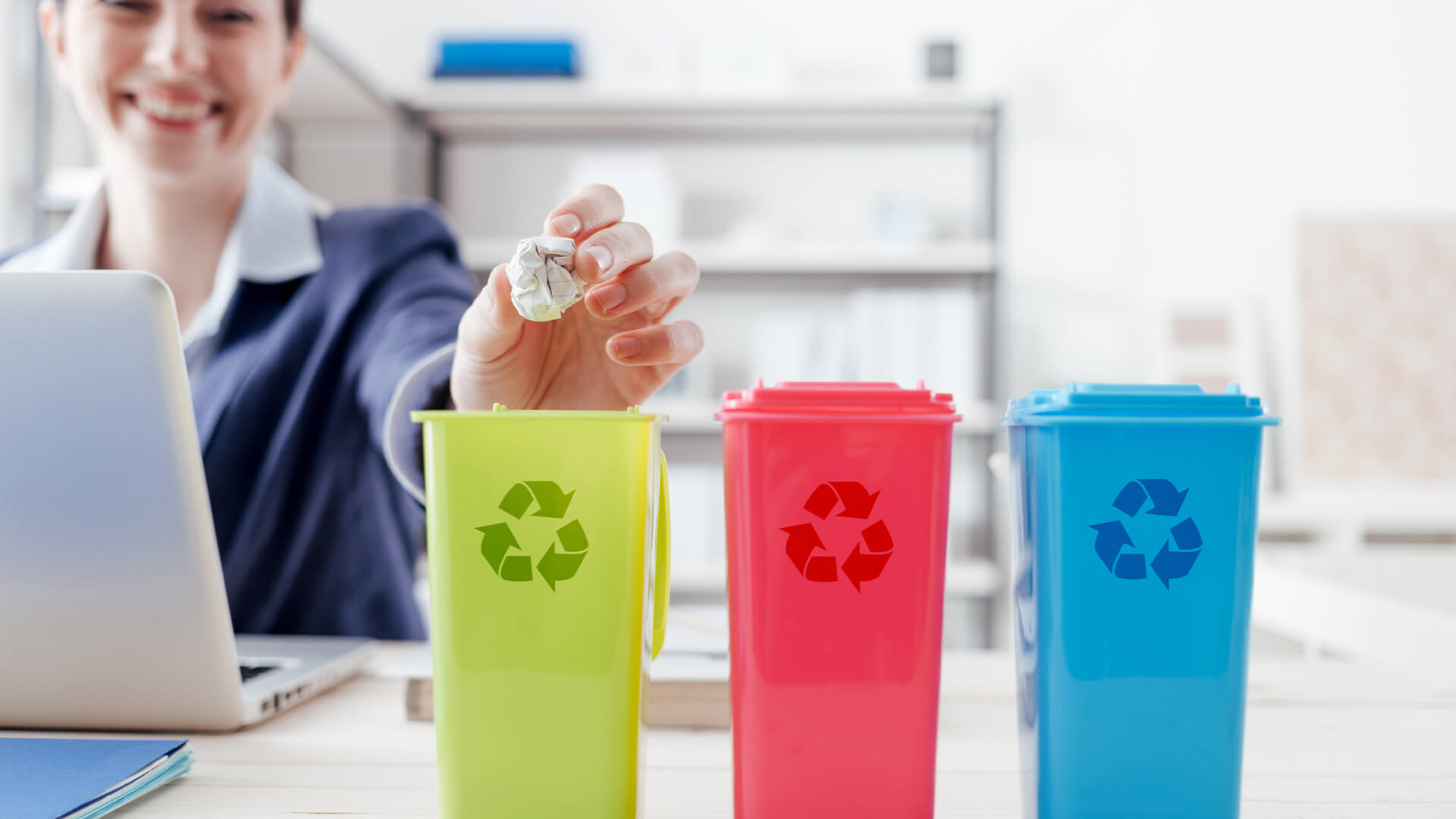No matter what industry an SME operates in, it is highly likely that they have at least some form of a recycling program. In 2019, companies are increasingly being encouraged by their clients and staff to do more for the planet – those that refuse to do so risk developing a reputation that will harm their bottom line in the long term.
Nevertheless, not all recycling programs are created equal. Many small and medium-sized businesses implement half-hearted policies that aim to tick the sustainability box, but that could do far more to reduce harmful waste. A recent report published by the British Government Office For Science estimated that the quantity of plastic in the world’s oceans will triple by 2025, highlighting the need for large scale commitments to sustainability.
Recycling is one of the simplest ways a company can make a difference, and by avoiding common recycling mistakes employees can do more to reduce their negative impact on the environment. Here are the best ways to motivate staff to recycle in 2019.
1. Introduce centralised recycling bins
One of the simplest, and most overlooked ways to increase recycling rates is to replace individual recycling bins with centralised recycling stations. While providing individual waste bins for staff would seemingly make it easier to recycle and plastic, the reality is that over time staff begin to throw their waste into the most convenient bin under their desk, potentially mixing waste and making it more difficult to recycle later on.
Employees working hard at their desks are less aware of what they’re throwing away, and can absentmindedly contaminate streams if they are in a rush to complete a task. It is therefore advantageous to create communal recycling stations where employees can learn what can and can’t be recycled.
2. Place recycling stations next to shredding stations
Even if an SME currently does little to no recycling, it is likely that they shred their waste documents. The recent GDPR legislation introduced across Europe has increased the responsibility businesses have regarding the security of personal data, and those that do not adhere to the new rules risk fines up to €20 million or 4% of annual global turnover.
GDPR specifies that personal information must be securely deleted once it is no longer required for the purpose it was originally obtained for. With shorter timescales to meet ensure compliance, companies across Europe are now shredding their waste paper more regularly. However, much of this shredded paper is simply thrown away in general disposal bins, especially if the recycling units are not located nearby.
This represents a missed opportunity for businesses to increase their recycling rates. A proactive step to take is to place recycling stations next to shredding stations to facilitate recycling, as employees will have greater incentive to dispose of their paper waste in a more sustainable way.
Alternatively, businesses can choose to outsource their shredding and recycling activities to expert contractors. Not only can this be a more secure way of shredding waste paper, it saves the business the hassle and time-investment needed to recycle paper on a large-scale.
3. Encourage employees to bring in old clothes
Paper, plastic and glass are not the only things businesses can actively seek to recycle. In 2019, businesses should also facilitate clothes recycling as much as possible. A recent study conducted by the Ellen MacArthur Foundation found that one bin lorry of textiles is wasted every second.
This worrying statistic stresses the impact of the clothing industry on the environment, and businesses looking to grow their brand as a sustainability-advocate should help their employees recycle their old clothes.
Businesses can simply allocate this responsibility to the Corporate Social Responsibility (CSR) team, who can send regular emails to the wider team inviting them to bring in clothes that they want to recycle. A member of the CSR team can then either donate the clothes to a local charity or take them to the nearest clothing bank.
4. Introduce an office upcycle station
An often overlooked way to recycle is to encourage staff to share their old or unwanted office supplies. Many, if not most employees will typically throw away old folders, notebooks and furniture when they decide they no longer need them. Indeed, it is estimated that 1.9 million office chairs are thrown away every year in the UK alone.
Much of this office waste is entirely avoidable. Chairs can be repaired, folders can be reused and notebooks can be recycled. However, employees can find it difficult to recycle these supplies without a system in place.
Organisations should therefore allocate a space where employees can leave their old furniture, phones, computers and stationery for others to use. Anyone needing to replace their old furniture can then go to the upcycle station rather than buy new items, thereby saving the company money and helping to reduce general office waste.
5. Educate staff regularly
A business can follow all of the tips outlined above, but if they fail to educate their staff on recycling best practice then it can all be for nothing. There are many common misconceptions regarding what can and cannot be recycled, and it is up to the management team to clarify the rules around this.
For instance, employees should be made aware that any containers or jars should be cleaned before placing them in the recycling bin, as otherwise any liquids can seep into any surrounding paper or cardboard and contaminate the bin.
Moreover, the vast majority paper coffee cups are not actually recyclable, as the inner lining contains plastic. There are recyclable versions available, such as the Earth Coating cups, but these are the exception rather than the norm. Many people do not know this, and consequently place their takeout cups in the recycling bin, making it difficult to sort the waste later on.
A business should therefore send regular emails around the office to remind them of these rules, as well as place posters in the recycling station with instructions on which bin should be used for certain items. Doing this can drastically improve the successful recycling rates of the wider business.
Key takeaways
Given the deteriorating health of the environment and the devastating impact of global warming, businesses of all shapes and sizes should take more care in how they recycle. By introducing centralised recycling units and upcycle stations, employees can more easily recycle or reuse old office equipment. Additionally, encouraging staff to bring in old clothes, recycling shredded paper and educating the wider team on best practice can help a business become more environmentally-friendly in 2019.








